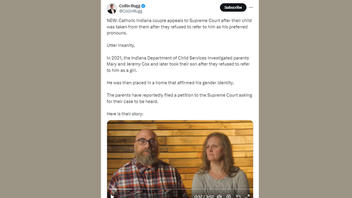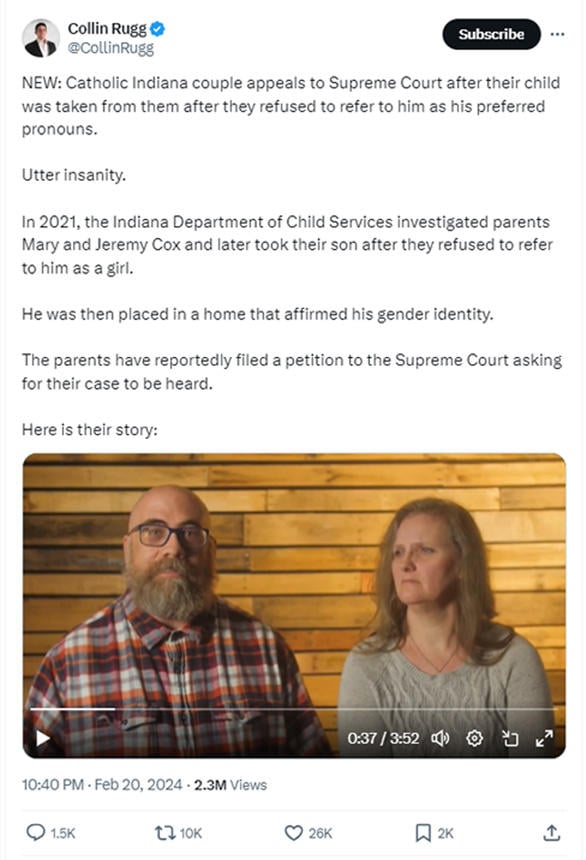
Did the Indiana Department of Child Services remove a child from their home because the parents refused to call them by their preferred pronouns, as a social media post suggests? No, that's not true: The complex situation outlined in Indiana court documents state that the child's removal from the home was not based on the fact that the parents did not accept the child's transgender identity. The child was determined to need services because they have an eating disorder that jeopardizes their health.
The claim appeared in a post with a video on X on February 20, 2024 (archived here), that began:
NEW: Catholic Indiana couple appeals to Supreme Court after their child was taken from them after they refused to refer to him as his preferred pronouns.
Utter insanity.
In 2021, the Indiana Department of Child Services investigated parents Mary and Jeremy Cox and later took their son after they refused to refer to him as a girl.
He was then placed in a home that affirmed his gender identity.
The parents have reportedly filed a petition to the Supreme Court asking for their case to be heard.
Here is their story:
This is what the post looked like on X at the time of the writing of this fact checkkk,:
The parents, Mary and Jeremy Cox, and the Indiana Department of Child Services are on opposite sides of this case. The Coxes filed a petition for a writ of certiorari with the Supreme Court of the United States on September 25, 2023. This is the primary way to petition this court for review.
This article quotes from the October 21, 2022, opinion from the Indiana Supreme Court of Appeals. But for ease of reference, additional key documents in the case timeline are linked below.
The child in question has reached the age of majority. In its January 2024 brief, the counsel for the Indiana Department of Child Services (DCS) maintains that because the child is now an adult, "this case is moot, and no relief can be given that would remedy petitioners' alleged injuries."
Timeline of documents
- October 21, 2022: Opinion by Judge Crone Indiana Supreme Court of Appeals (archived here).
In the Matter of A.C. (Minor Child), Child in Need of Services, v. Indiana Department of Child Services, Appellee-Petitioner And M.C. (Mother) and J.C. (Father), Appellants-Respondents - December 13, 2022: Termination of Wardship -- addendum at the end of the January 2024 brief (.PDF file here)
- September 25, 2023: Petition for a writ of certiorari in the Supreme Court of the United States (.PDF file here) by Counsel for Petitioners (parents)
- January 2024: Brief in opposition to the Petition for Writ of Certiorari in the Supreme Court of the United States (.PDF file here) by Counsel for Respondent (Indiana Department of Child Services)
- February 2024: Reply Brief for Petitioner (.PDF file here) by Counsel for Petitioners (parents)
The scope of this fact check is not to consider all the details of a case that may go before the Supreme Court, including the parents' concerns regarding free speech and parental rights. This article will focus on why the child was removed from the home -- context missing from the social media post.
The video in the X post shows Mary and Jeremy Cox telling their story. The 3:52-minute-long video seems to cut off abruptly, just as Jeremy Cox says, "This should not happen to anyone else." Nothing of substance was removed from the original edit -- the video posted on January 17, 2023, on the YouTube channel of the Indiana Family Institute does not have any further footage of the Coxes speaking. The only addition is a few seconds of a blue screen with text captioning urging the viewer to "Use the link in the description to learn how you can support the Indiana Family Institute."
Between 2:15 and 3:02 minutes in this video, the Coxes say:
Mary: We didn't pursue an affirmational approach with our child because first as Christians we believe God created us as male and female. As parents it's our job to help our children to reach their full potential and the only way we feel to do that is to raise our children through our Christian beliefs.
Jeremy: Secondly we didn't go with the affirmation approaches because we did a lot of research on this subject. There are many different approaches, we spoke to multiple mental health care providers and ultimately decided that affirmation was not going to help our child.
This video testimony from the parents does not mention all the aspects of the case detailed in the October 21, 2022, opinion from the Indiana Supreme Court of Appeals. Notably absent is the complex question of the child's mental and physical well-being, which the court acknowledges does not exist separately from the parents' beliefs. The word used to describe how the parents' beliefs and the child's eating disorder are connected is "nexus," defined by Merriam-Webster as:
noun
1: CONNECTION, LINK
the nexus between teachers and studentsalso : a causal link
the nexus between poverty and crime
In paragraph 19, the court's opinion refers to the record of an earlier trial court's understanding of the case. Portions of the text appear with the court's emphasis added in italics:
The ultimate goal is for family reunification [...] the reality is this is an extreme example of a child having a certain lifestyle that the parent[s] don't agree with. That has been going on for all time. There ha[ve] always been issues where children do things that the parent[s] don't agree with be it religiously or morally or whatever. That happens and that is not a reason to remove a child from the home, but when it as in this case there is a clear nexus between that issue and the medical and psychological issues that the child is having that is when we get issues that we have here today that the State is now involved in and because of those issues the child is a ward of DCS and those decisions are going to have to be made through the Court so I certainly understand the objections and the parent[s'] views and I am not discounting the parent[s'] views
The acronym CHINS (Child In Need of Services) appears frequently in this case summary. The reasons why the DCS may deem services are needed fall into 11 different numbered categories outlined by DCS (.PDF here). Complicating this case is that initially, at the end of May 2021, CHINS-1 (neglect) and CHINS-2 (abuse) were the reasons cited for DCS involvement.
A DCS family case manager's report said "Mother and Child both stated that Child had been suffering from an eating disorder for the past year but had yet to be evaluated by a medical professional." In early June the court issued the initial detention order to remove the child from the home. At the end of October, due to a worsening eating disorder, DCS changed the CHINS petition to add CHINS-6 (substantially endangering their own health). In mid-November, the CHINS-1 and CHINS-2 allegations were expunged from the record relating to the parents. In paragraph 20 the court again states explicitly that the reason for the removal from the home was not due to the parents' acts or omissions:
While the court recognized a connection between Child's medical and psychological issues and Child's disagreement with the Parents, the mere existence of that connection does not mean Child's disposition runs contrary to the CHINS-6 statute. As the court emphasized, this is an extreme case where Child has reacted to a disagreement with the Parents by developing an eating disorder and self-isolating, which seriously endangers Child's physical, emotional, and mental well-being. The court's decision to continue Child's removal was not a response to the Parents' acts or omissions relating to their beliefs regarding transgender individuals, and the court was not treating the case as if it were based on a CHINS-1 or a CHINS-2 adjudication. Rather, the trial court's focus was clearly on Child's medical and psychological health needs, and the court's decision to continue Child's placement outside the home is consistent with the CHINS-6 statute.
Additional Lead Stories fact checks of claims related to gender identity can be found here.


















